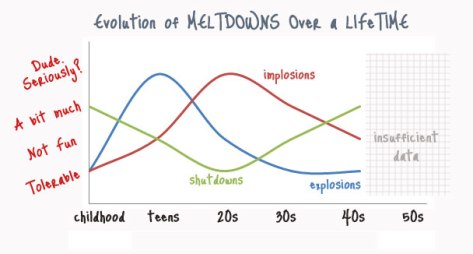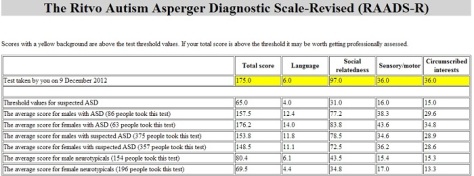The blog will be on hiatus through the holidays. Thank you for reading, commenting and sharing these past few months. I hope you all have a safe, happy and peaceful holiday and I’ll see you in 2013!
—–
I was going to start this out by saying that being an aspie has certain challenges. I was going to acknowledge how those challenges can be quite severe and then talk about the positive traits of Asperger’s in a measured, careful way.
But you know what? Screw that. Today I’m going to celebrate being an aspie.
I’m going to celebrate myself.
My Aspie Strengths (or How Asperger’s Has Made Me Awesome)
Many of my Asperger’s traits are double-edge swords, gifting me simultaneously with challenges and strengths. Impaired perspective taking? It makes it harder for me to work out people’s intentions but it also makes me nonjudgmental. Trouble with generalizing? That means I have to learn a similar lesson many times over, but gifts me with a dogged optimism and unconventional problem solving skills.
Curiously, some of my aspie strengths are a direct result of my funky wiring but many are coping mechanisms that I’ve developed to survive in a neurotypical world. Asperger’s has made me a survivor–forced me to adapt, by choice and necessity. The result is a unique set of strengths. Here they are, in no particular order:
I’m nonjudgmental. I take people at face value and will give someone the benefit of the doubt until they prove me wrong. A lifetime of being judged on appearance and first impressions will do that to you, I suppose.
I have a strong attachment to the truth. Telling it. Seeking it. Hearing it. If you ask me a question, you’ll get an honest answer. Perhaps more honest than you’d like. If you lie to me, I won’t forget it. I value honesty above many other traits–probably because I’m so bad at detecting dishonesty.
I’m curious. Insatiably so. I love learning, discovering, knowing. If you’re passionate about something and you want to share it with me, I’ll listen with genuine enthusiasm. My interests are wide-ranging and ever-evolving. My need for knowledge feels limitless, exciting and empowering. Give me an answer and I’ll have a handful of questions in reply.
I’m loyal. My attachments to people are few, but when I do form a bond with someone it’s a strong one. I will stand up for the people I care about in the face of a great deal of opposition. When Temple Grandin said that an autistic child will run into a burning building to save a person they love, she wasn’t kidding. That’s me in a nutshell.
I’m sincere. Perhaps naively so. I don’t have the patience or energy to be manipulative. I’m generally good-intentioned. When I do something for another person, I do it wholeheartedly. People often seem puzzled by my sincerity, disbelieving, as if being sincere is in itself some elaborate form of manipulation.
I have well-defined values. The black and white thinking of Asperger’s means that I’ve developed an elaborate and clearly delimited value system. This can be a blessing and a curse. There is a thin line between being principled and being stubbornly dogmatic. At most times, though, my values are my compass and my rudder, helping me navigate the ambiguities of a neurotypical world.
I’m an unconventional problem solver. I’m not afraid to ask wild questions or examine solutions that appear to have little hope of working. My instincts can get way ahead of my ability to verbalize them. Often, I’m told that things won’t work or don’t make sense–right up until I go ahead and do what I have in mind and it works. Or doesn’t. It’s a crapshoot, but that does little to dent my confidence and willingness to try.
I’m an optimist. I live in the here and now. I have few regrets. I view situations starting from zero. Aspies aren’t very good at generalizing from one occurrence to another similar occurrence, which I think leads to an irrational level of optimism. Sure something went wrong in the past, but (my brain always seems to say) this time will be different. Sometimes it is. Either way, I’ve found that taking the optimistic view of life makes me happy.

My Aspie Superpowers (or How Asperger’s Has Made Me Who I Am)
One of the myths of Asperger’s is that all aspies are savants–that we’re born with some profound skill, like the ability to name the day of the week for any date in history, draw the New York subway system from memory, or do complex mathematical calculations in our heads.
Some aspies are savants, but sadly, I have no savant skills. I’ve always been fascinated by people who do. I think it would be amazing to have a photographic memory or to instinctively understand a system like mathematics.
Like a lot of aspies, I do have a few overly developed traits. They aren’t at the level of a savant skill, but I’ve started to think of them as my aspie superpowers. They’re the things about me that people comment on as being out of the ordinary or above average. They’re a significant part of my self-identity:
I’m perceptive and detail oriented. I notice everything: changes and irregularities, patterns and habits. I can analyze the hell out of things. I see patterns where most people don’t. My affinity for details began as a coping mechanism, I think–a way to identify patterns in social situations that I couldn’t work out instinctively. Now it’s become my default mode for making sense of the world around me.
I have a high IQ. This may not seem related to Asperger’s until you think about what an IQ test is: logic, problem solving, pattern recognition. Especially pattern recognition. The question about what number comes next in the sequence? Pattern recognition. Which shape is missing in the grid? Pattern recognition. Is the sum of the odd numbers between 1 and 12 an even number? Yep, that one is pattern recognition, too. Or it is if your brain works like mine.
I’m calm in a crisis. If something goes wrong, I have an almost superhuman ability to separate myself from the situation and think clearly. Poor executive function combined with impaired perspective taking lets me focus on the facts at hand when others get overwhelmed by panic or “worst case scenario” thinking.
I’m dependable and disciplined. Both of these have roots in my Aspergarian need for routine. Once I get a routine in place, I can do the same thing day after day without tiring of it. I can keep the books, walk the dog, sort the mail–day after day, like clockwork–as long as it’s part of my daily schedule. I’m the kind of person people rely on. I get things done.
I’m determined. Perseveration has a huge upside. If a problem or task catches my attention, I’ll go at it like a doberman with a ragdoll. I’ll work at something long past the time when a more rational person would throw in the towel. A big part of success for me is simply not giving up too soon.
Okay, looking back on that list, it looks rather boring. There’s a reason The Scientist jokingly calls me “Data” at times. But Data saved the Enterprise as often as Picard, right? I like my boring superpowers. They’re useful. They’ve served me well.
Asperger’s or Personality?
The line between my aspie traits and my other more typical personality traits can be a fuzzy one. In the absence of Asperger’s would I still have the strengths that I do? Doubtful. I’d be a different person. Look at my list of strengths. Do you see compassionate, caring, or intuitive on it? How about spontaneous, sympathetic or a team player? I am all of things in varying degrees, but they aren’t my strong points.
My strengths are typically Aspergarian. Without Asperger’s I might be a less extreme form of myself–a blend of my current traits with neurotypical traits. I fear that I’d lose most of my superpowers, though I might gain other superpowers in place of them.
Do NTs have superpowers? Surely they must. I think The Scientist has social superpowers. He’s remarkably charming, persuasive, likeable, confident and intuitive. It’s as hard for me to imagine what he would be like with an aspie brain as it is for me to imagine myself as an NT.
Not that I ever really do. I like being an aspie. Sure it’s a pain in the ass sometimes, but take away Asperger’s and I’m no longer me.
I like me! Have I said that? Are you tired of hearing it yet? Because this is important. I’m autistic and I like myself. There are people who would find that hard or even impossible to believe.
I like being a little different. I like my aspie strengths and superpowers far more than I dislike my aspie weaknesses. Let’s face it, everyone has weaknesses. Everyone faces challenges. The perfect person, the perfect life–that doesn’t exist.
What Are Your Strengths and Superpowers?
The idea of a distinct set of aspie strengths has its roots in Tony Attwood and Carol Gray’s “The Discovery of Aspie Criteria.” They proposed seeing Asperger’s as a set of strengths and talents rather than a syndrome of deficits. If you’ve never seen the list, you can find it in that article–scroll down a few screens until you see the numbered lists. If you haven’t yet identified your aspie strengths and superpowers, it’s a great place to start.




















